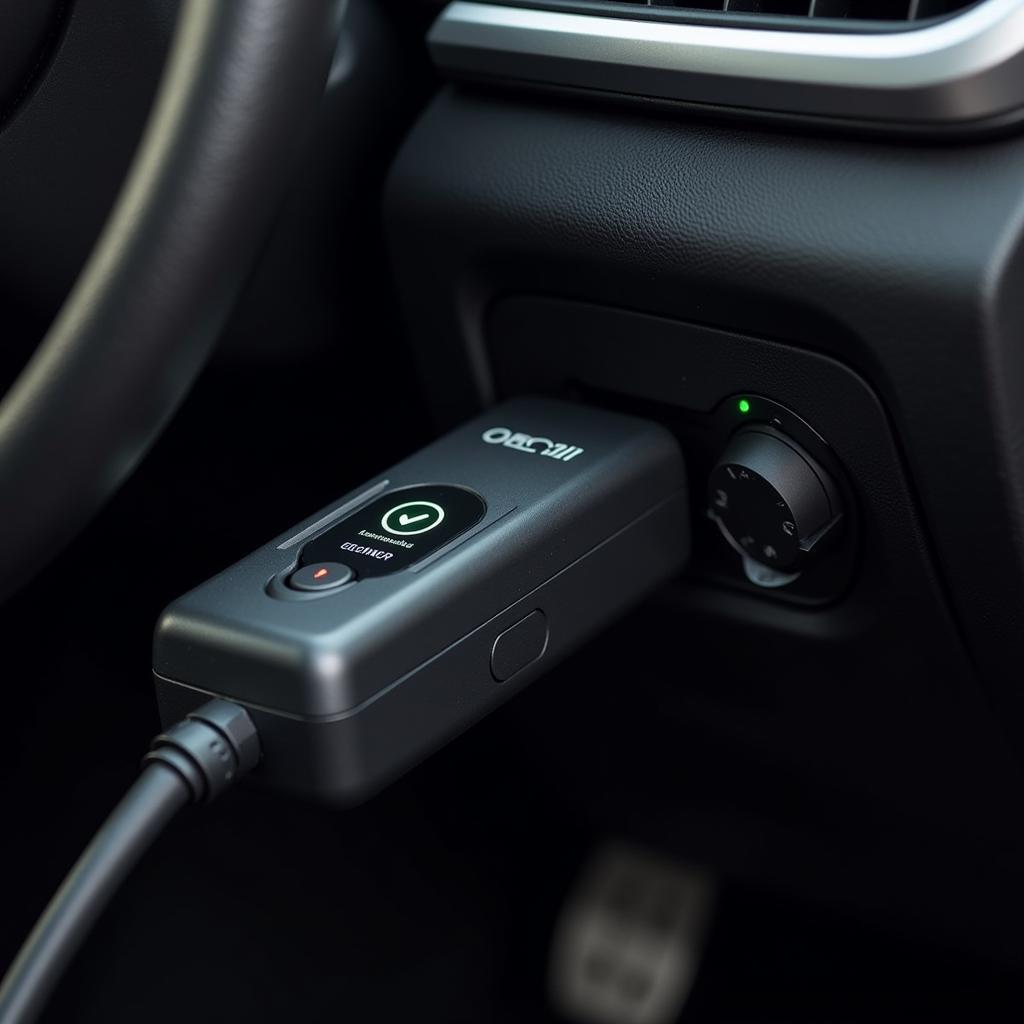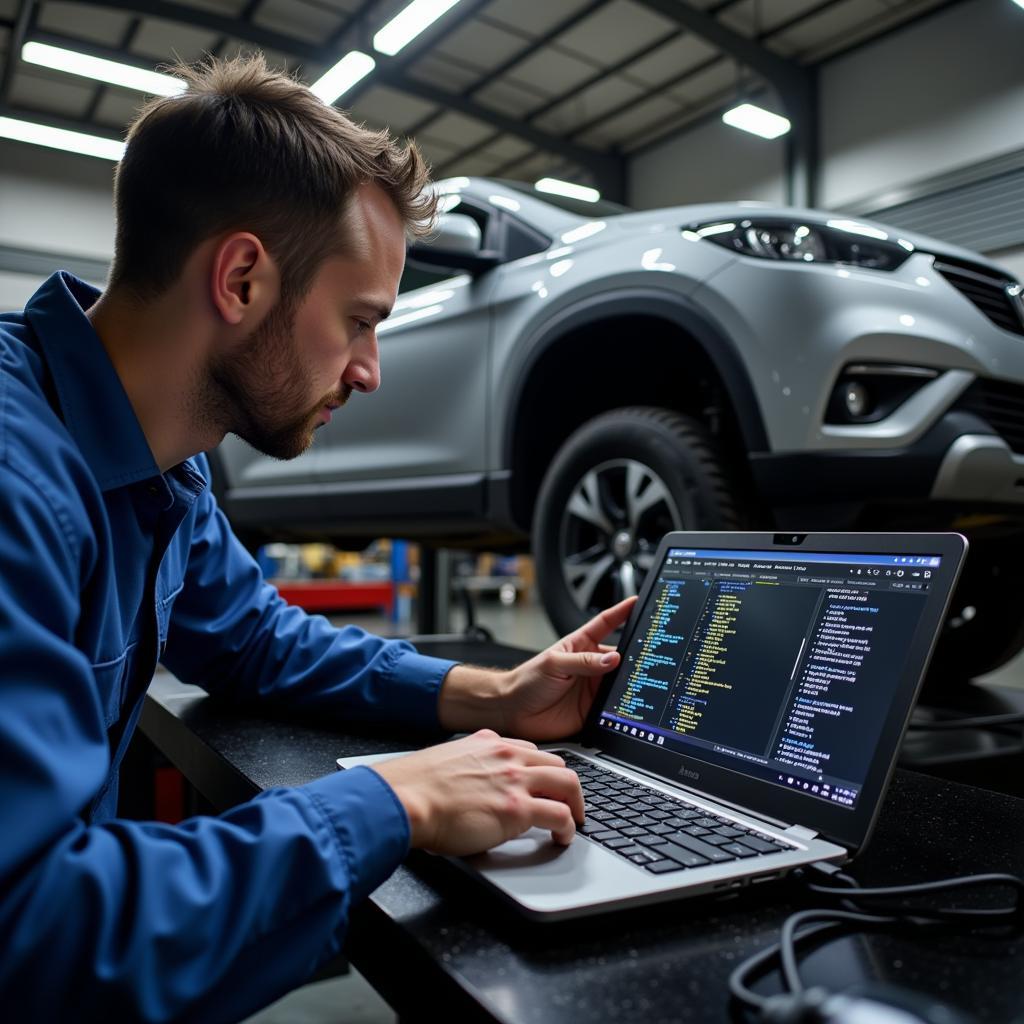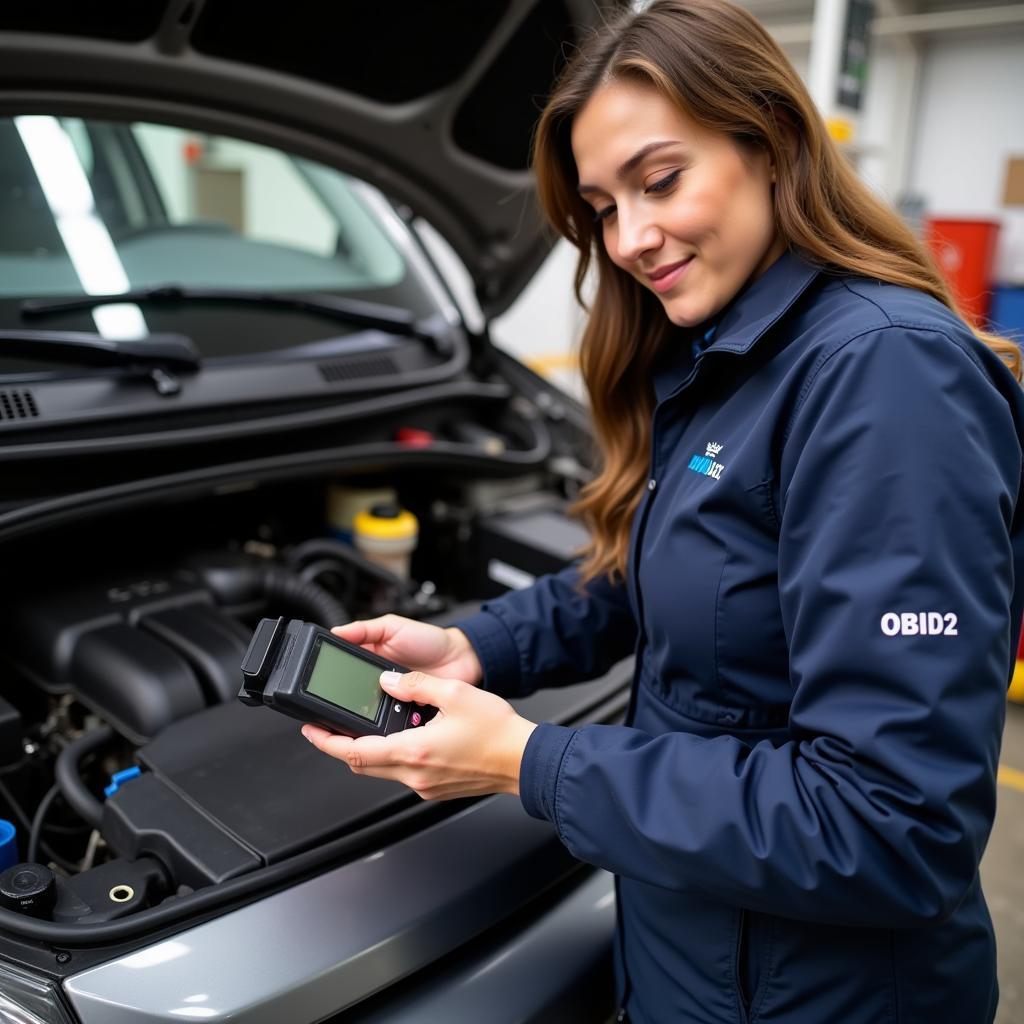Car diagnostics. These two words can bring a sense of relief or dread to any car owner. But What Does Car Diagnostic Consist Of, exactly? In simple terms, it’s like giving your car a comprehensive health checkup using advanced technology to pinpoint issues affecting your vehicle’s performance.
Delving into the Depths of Car Diagnostics
Gone are the days of relying solely on a mechanic’s intuition and experience. Today’s vehicles are complex machines controlled by intricate computer systems. Car diagnostics involve tapping into these systems using a specialized tool called a car diagnostic scanner, often referred to as an OBD2 scanner.
 Car Diagnostic Scanner Connected to Car
Car Diagnostic Scanner Connected to Car
This scanner acts as a communicator, retrieving data from your car’s computer and translating it into understandable codes and parameters. This information provides a detailed snapshot of your car’s health, revealing:
- Engine Performance: Fuel efficiency, ignition timing, air intake, and more.
- Transmission Functionality: Gear shifting, fluid pressure, and potential issues.
- Emissions System: Monitoring of catalytic converter function and exhaust emissions.
- Braking System: ABS functionality, brake fluid pressure, and potential faults.
- Safety Restraints: Airbag system health and deployment readiness.
Unraveling the Mystery of Diagnostic Trouble Codes (DTCs)
When you see the dreaded “check engine” light illuminate your dashboard, it’s your car’s way of saying, “Hey, something’s not quite right here.” This is where DTCs come into play. These codes are like secret messages from your car’s computer, indicating a specific area of concern.
For instance, a code like “P0301” signals a misfire in cylinder 1. While this may sound alarming, a car diagnostic tool can pinpoint the root cause, be it a faulty spark plug, a clogged fuel injector, or something more complex.
 Mechanic Analyzing Diagnostic Codes on Laptop
Mechanic Analyzing Diagnostic Codes on Laptop
Car Diagnostics: More Than Just Reading Codes
While retrieving and understanding DTCs is a crucial aspect of car diagnostics, it’s only one piece of the puzzle. A comprehensive car diagnostic session goes beyond simply reading codes. It involves:
- Visual Inspection: A thorough examination of your vehicle for any visible signs of damage, leaks, or wear and tear.
- Scanning for Codes: Connecting a diagnostic scanner to retrieve and interpret DTCs stored in your car’s computer.
- Data Analysis: Evaluating live data streams from various sensors to assess real-time performance and identify intermittent issues.
- Component Testing: Performing targeted tests on specific components to confirm suspected faults and ensure proper operation.
- Troubleshooting: Using a combination of knowledge, experience, and specialized equipment to diagnose and repair the identified problems.
The Benefits of Regular Car Diagnostics
Just like regular doctor visits help maintain your health, routine car diagnostics play a vital role in keeping your vehicle running smoothly and safely. Here’s how you benefit:
- Early Problem Detection: Catching issues early can prevent costly repairs down the road.
- Improved Performance: Addressing minor issues can optimize your car’s fuel efficiency, power, and overall performance.
- Enhanced Safety: Ensuring all safety systems are functioning correctly provides peace of mind on the road.
- Increased Resale Value: A well-maintained vehicle with a documented service history commands a higher resale value.
“Regular car diagnostics are not just for older cars,” says automotive expert John Smith, lead mechanic at ABC Auto. “Modern vehicles are packed with technology, and regular checkups can help ensure everything is functioning optimally.”
Empowering Car Owners through Knowledge
 Car Owner Using OBD2 Scanner at Home
Car Owner Using OBD2 Scanner at Home
While professional mechanics have the expertise and equipment to perform comprehensive car diagnostics, understanding the basics empowers car owners to stay informed about their vehicles. You can purchase your own OBD2 scanner how to use a car diagnostic tool and access a wealth of online resources to interpret codes and gain a better understanding of your car’s health.
Car Diagnostics: Your Key to a Smooth Ride
In today’s world of technologically advanced vehicles, car diagnostics have become an essential part of car ownership. Whether you’re experiencing car trouble or simply want to ensure your vehicle stays in top shape, understanding what car diagnostics consist of empowers you to make informed decisions about your car’s maintenance and repairs. By embracing this technology, you can ensure a smoother, safer, and more enjoyable driving experience for years to come.
FAQ:
Q: How often should I get my car diagnosed?
A: It’s generally recommended to have your car diagnosed at least once a year or every 12,000 miles, whichever comes first.
Q: Can I diagnose my car myself?
A: While you can purchase an OBD2 scanner and access online resources, professional mechanics have the expertise and advanced equipment to perform a comprehensive diagnosis.
Q: What if the “check engine” light comes on?
A: It’s crucial to get your car diagnosed by a professional mechanic as soon as possible. Ignoring the warning light could lead to further damage and costlier repairs.
Q: Are car diagnostics covered under warranty?
A: Warranty coverage for car diagnostics varies depending on the vehicle manufacturer and warranty terms. It’s best to consult your warranty documentation or contact your dealer for clarification.
Q: What if I don’t understand the diagnostic codes?
A: There are many online resources and forums dedicated to helping car owners understand diagnostic trouble codes. However, for a definitive diagnosis and repair plan, consulting a professional mechanic is always recommended.
Need help with car diagnostics? Contact our team of experts on WhatsApp at +1(641)206-8880 or email us at [email protected]. We are available 24/7 to assist you.
Interested in learning more about specific car diagnostic topics? Explore our other informative articles:

Leave a Reply